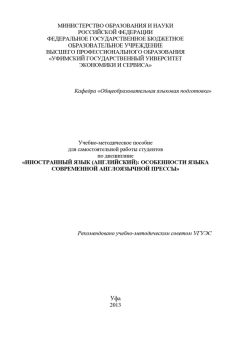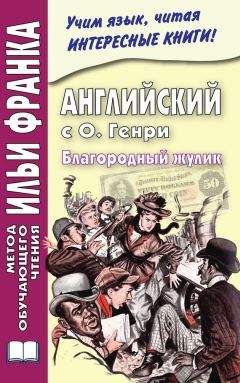Денис Шевчук - Английский для экономистов (учебник английского языка)
Все авторские права соблюдены. Напишите нам, если Вы не согласны.
Описание книги "Английский для экономистов (учебник английского языка)"
Описание и краткое содержание "Английский для экономистов (учебник английского языка)" читать бесплатно онлайн.
Английский для экономистов – учебное пособие предназначено для студентов экономических специальностей и рассчитано на лиц, обладающих знанием нормативной грамматики английского языка и имеющих словарный запас в 2000 лексических единиц.
Английский язык для экономистов состоит из 8 разделов, охватывающих широкий круг тем по экономике и бизнесу: экономика, организация, бизнес, менеджмент, маркетинг, реклама, деньги, банки, финансы, бухучет, аудит, резюме экономиста на английском языке и др. Все тексты взяты из оригинальных английских и американских источников. Разделы (равно как и тексты) могут прорабатываться в представленной последовательности или выборочно – в зависимости от целей, задач и уровня подготовки группы, изучающей английский для экономистов. Это эффективный учебник английского языка для экономистов (деловой английский для экономистов).
3. Something that you must do or possess in order to be allowed to do some other thing.
4. The state of being real, alive, or actual.
5. Energy in the form of thought, action, time, or money that people use in their work.
6. It influences someone or something or causes them to change in some way.
7. Succeed in doing or finishing something.
8. Being responsible for and prepared to justify one’s actions.
9. A good result of something.
10. A person who buys things or uses services.
11. A particular, recognizable way in which something is done or organized.
12. To include somebody or something as a necessary part or use them in some way.
Ex. 4. Make the following words negative. Use prefixes -un, -in, -mis, -dis, -ir, and so forth.
Human, existence, enable, realized, regard, responsible, careful, systematic, effective, mature, aware, understand, loyal, formal, direct, continuous.
Ex. 5. Give the opposites to the following words. Use each of them in your own sentence.
Flexible, voluntary, to share, to adhere to, enjoy, confidential, consensus, versus.
Ex. 6. Be sure you know the meaning of the words given below. Give their derivatives.
Existence, accomplishment, benefit, authority, obligation, responsibility, extend, consider, favour, perception, value, equal, assume, conscious.
Ex. 7. Give the synonyms to the following words. Make up your own sentences to show the shades in their meaning.
To handle, to accomplish, goal, benefit, coerce, to achieve, to purchase, output, affect, to establish, to enhance, power.
Ex. 8. Translate into Russian. Pay attention to the economic and business terms.
1. Business is the production, buying, and selling of goods and services.
2. A business, company, or firm is an organization that sells goods or services.
3. A business is also may be referred to as an enterprise to emphasize its adventurous, risk-taking qualities, and business in general may be referred to as free enterprise and private enterprise.
4. Large companies are referred to as corporations, especially in the US.
5. Large companies operating in many countries are multinationals.
6. An entrepreneur is usually someone who builds up a company from nothing: a start-up company.
7. The people legally responsible for a company are its board or board of directors.
8. When a private company is bought by the state and brought into the public sector, it is nationalized.
9. When the state returns a company to the private sector in a sell-off, it is privatized.
10. A holding or holding company is one that holds stakes in one or more subsidiaries.
11. A holding company’s relationship to its subsidiaries is that of parent company.
What words and word combinations from ex. 8. do you consider to be economic and business terms? Explain what they mean.
Ex. 9. Translate the following text in written form.
The Interdependence of Society and Organizations
Modern societies have been called organizational. Unlike so-called prim–itive societies, modern ones produce most of their goods and services through special-purpose organizations that are, in the main, neither famil–ial nor tribal. Some of the organizations of a modern society are meant to earn a profit and some are «not-for-profit».
The organizational mode of conducting society's affairs means that virtually everyone in modern societies depends mightily upon how well organizations function. We look to them for goods and services of ade–quate quantity, quality, and a low enough price. We look to them for jobs to earn the money to buy what we need. We depend upon them for decent and healthful environments on and off the job.
In turn, organizations depend upon the contributed talent and effort of people who work in them. Every organization must obtain these con–tributions and other resources and convert them into some outputs that yield sufficient rewards to keep the organization alive and functioning. In a word, the relationship of society and organizations is one of interdependence. But what kind of interdependence?
Managerialism ( the ideological principle on which the economic, social and political order of advanced industrialized societies is actually based) proclaims that the society is made up of organizations, corporations, associations, and so forth – not individuals. Social decisions are a consequence of the interactions of the managers of the social units – not the will of the people, the demands of consumers, or the needs of workers.
1. Do you share the point of view of the author of the text?
LET’S READ AND TALK
1. Why do people try to «organize» themselves?
2. What formal and informal organizations do you know?
3. “Informal groups develop in order to meet a variety of individual needs which are not met by the formal organization.” Do you share this opinion?
TEXT 1
Read the text. Define the main idea of each paragraph. What are the key sentence(s) of each paragraph?
ORGANIZATION
Early in human existence people learned that their individual efforts often fell short of success. They found that they were unable to accomplish many tasks that require more than individual effort. The result was that only limited goals could be attained. Therefore the necessity of group activity was discovered relatively early in human existence.
Group activity could be aimed at some higher, more complex set of goals and could thus bring greater benefits to all concerned. This quality of group activity must be counted as one of the chief requirements for success. Cooperation is a prime element of a group of people who want to achieve more than they can acting individually. A system of group relationships built upon and fostering cooperation, then, is basically the meaning of an organization.
This system of cooperation consists of several parts: the human element, the physical element, the work element, and the coordination element. All of these elements, taken collectively, can be thought of as an organization. Today, this system of cooperation is much more complex than it was in the first attempts at organization.
Thus, organization is an open, dynamic, purposeful social system of cooperation designed to enhance individual effort aimed at goal accomplishment; consists of the human element, the physical element, the work element, and the coordination element; transforms resources into outputs for users.
It is important to examine the various parts or components of organization theory in order to outline its broad scope. These components are:goals, work, power and authority, delegation, structure.
It was stated earlier that organizations were established to enable an individual to accomplish more in a group than he could as an individual. In other words, organizations are devices for pooling talent and ability into an effective whole that can accomplish some desired objective. Every organization is initially built to accomplish some goal. The goal or purpose is an unrealized state or condition that the members do not possess but which they deem desirable. It is imperative that organizational goals be clearly defined and communicated to all organization members who are to be affected by them. Goals are the starting point for the design and maintenance of the organization itself. At the same time, these goals must meet a need that society has defined as important. Thus, consumer needs play a crucial role in organization.
Once the goal of an organization is established, it is time for the members to decide on the type of work activity that will be necessary to accomplish these goals. Basically, any organization must perform two fundamental types of work: primary and secondary. The primary work (it also commonly referred to as line work) consists of production and distribution of goods and services that will satisfy consumer needs. The secondary work (it is often termed staff work) consists of all those activities that support and extend the operations of primary work. For example, in a manufacturing firm, the secondary work would include accounting, personnel and quality control.
No theory of organizations would be complete without a treatment of the roles that power and authority play in organizational activity. These two components of theory help explain the network of relationships that tie the other components of an organization together into some logical pattern.
Power is the ability to influence others successfully. It comes from any single or combination of possible sources. For example, one can have power over others because of one’s intelligence, skill, or money. Regardless of its source, power enables its holder to exercise one’s will over others. Thus, in order to understand the total workings of an organization, one must have an appreciation of the role that power plays in these workings.
Authority can be defined as power that has been given official recognition bythe organization. Once an organization legally authorizes an individual to act on its behalf, that person is said to possess authority. Every member of the organization has some amount of authority to take action necessary to carry out his responsibility. The concern of the theorist is to understand how authority comes to be officially recognized by the organization and what considerations should be made regarding its use.
Organizations that enjoy any measure of success find it necessary to increase their membership and to assign duties to these additional members. The process that is used to add members to the organization will result in the necessity to divide the work of the organization into sub-units or groups. Each of these groups will be under the direction of a manager or managers. In order for these managers to perform their managerial duties properly, they must be granted appropriate responsibility and authority. The means for making these assignments is termed delegation. In general, delegation may be defined asthe process of transferring an obligation (responsibility) and anaccompanying right(authority) from a superior to a subordinate position in the organization. It is this basic process that enables an organization to grow. Without delegation, an organization simply cannot exist and prosper.
The patterns of work divisions and their hierarchical arrangements constitute the basic components of structure. Structure, then, is the hierarchical pattern of authority, responsibility, and accountability relationships designed to provide coordination of the work of the organization. It is basically a managerial tool that aids in guiding the organization towards its goals and can be considered the skeleton of the organizational body. The idea of hierarchy of authority, the division of organization by function, the differentiation of responsibility of the line (doers) and the staff (the advisors) are all inventions of the church and military leaders who were faced with the need to manage large aggregations of human, technical, and material resources. Organizations create an officially sanctioned structure known as the formal organization or de jure organization. This structure is often depicted by a chart as that seen in Fig. 1.
A formal organization is only half the story, for superimposed on these relationships is a whole series of informal or de facto relationships that are not sanctioned by the organization. These include informal work groupings of employees, informal leaders, informal channels of communication and informal power and status differentials. Usually the structure of an organization is rather permanent and stable but in some cases a temporary, ad hoc, organization may be created. The organization exists to reach a certain goal or set of goals and disbands once the goal is achieved.
1. What did people find early in human existence?
2. What is the meaning of the organization?
3. What is an organization?
4. What are the components of organization theory?
5. What role do power and authority play in building every organization?
6. What is the starting point for the design of an organization?
7. What is delegation and why is it necessary in today’s organization?
8. Which is more important: formal or informal structure?
9. Can you give any example of an ad hoc organization?
TEXT 2
Read the text and be ready to answer what theory you would follow as a manager. Give your reasons.
PEOPLE IN ORGANIZATION
If there is any one characteristic of people which is universally valid and important, it is that they differ. To say that all persons are created equal is a statement of human rights under the law. It communicates nothing at all about human nature. As a matter of fact, people differ greatly in intelligence, aptitudes, physical strength, manual dexterity, knowledge, skill, interests, personality traits, motivation, and many other attributes which potentially influence behavior and productivity.
We are rational – but only to a point. We plan, set goals, think, reason, and live by creeds and values. But we also become frustrated and behave in ways that can be perceived as rational only by someone who understands all our deeply embedded, sometimes conflicting needs, aspirations, and perceptions. In many situations our motivation is unconscious so that not even we understand our own actions.
The fact that one’s environment strongly influences behavior is indisputable. A number of prominent psychologists have assumed that human freedom is an illusion. Human choices are thought to be totally determined. This, of course, is an assumption. Many people do not subjectively perceive themselves in this way. It is significant that behavior and expectations are strongly influenced by what a person believes to be true. Individuals feel responsible for their actions. Also, people consciously believe that their choices are real, regardless of any awareness of philosophical arguments to the contrary. Organizations cannot function optimally without these pragmatic assumptions.
There are, of course, innumerable statements which one might make about human nature, but they would not all have a direct influence on how people should be dealt within the work environment. The late Douglas McGregor did an excellent job of conceptualizing some of the assumptions about human nature which are relevant to organizational behavior. He labeled these, Theory X, the classical or traditional view, and Theory Y, a progressive view upon which he believed a new model for human relations in organizations could be developed.
Подписывайтесь на наши страницы в социальных сетях.
Будьте в курсе последних книжных новинок, комментируйте, обсуждайте. Мы ждём Вас!
Похожие книги на "Английский для экономистов (учебник английского языка)"
Книги похожие на "Английский для экономистов (учебник английского языка)" читать онлайн или скачать бесплатно полные версии.
Мы рекомендуем Вам зарегистрироваться либо войти на сайт под своим именем.
Отзывы о "Денис Шевчук - Английский для экономистов (учебник английского языка)"
Отзывы читателей о книге "Английский для экономистов (учебник английского языка)", комментарии и мнения людей о произведении.



















